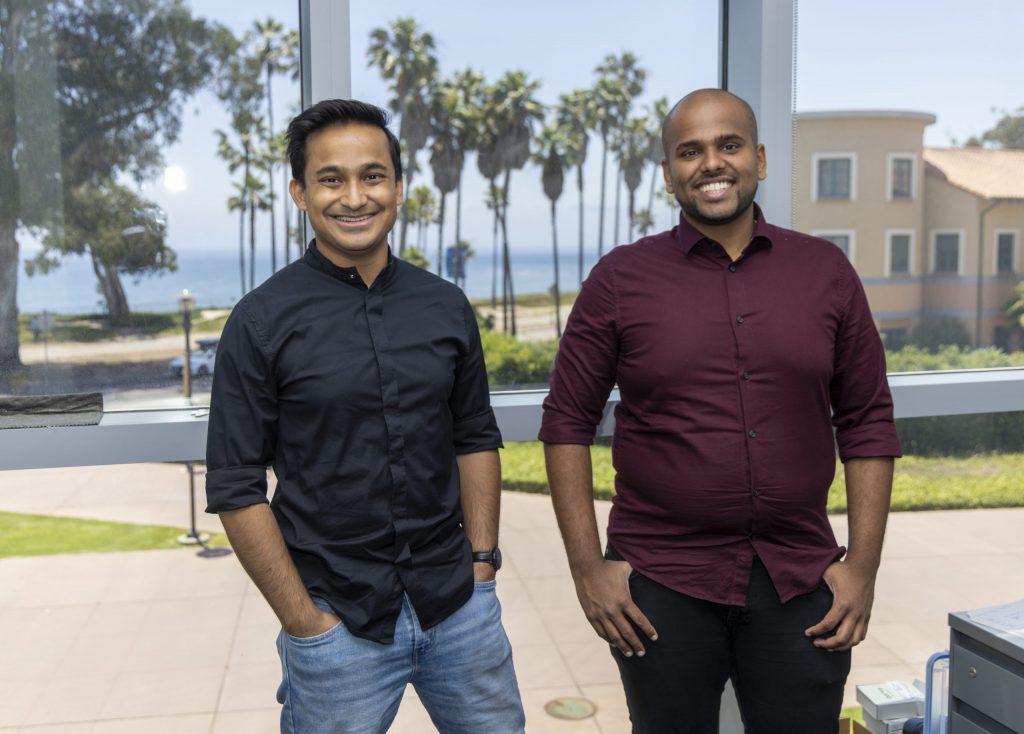No baggage left behind: Avi.AI helps cut down on luggage loss in aviation
IN THIS ARTICLE
- Latest news Topic
- Jorge Mercado Author
By Jorge Mercado Friday, June 30th, 2023

Vivek Adarsh’s inspiration to start his company just a couple of years ago, Avi.AI, is a story that will resonate with almost anyone whose been on an airplane before.
While completing work for his Ph.D. program at UCSB in 2019, Adarsh was traveling to Amsterdam for an academic conference where he was to present in front of many notable people, including Nobel Laureates.
Unfortunately for him, while his flight to Amsterdam arrived on time, his luggage did not.
“As you could imagine I had nothing to wear for my presentation and I ended up giving that presentation in my sweats — the same ones I was wearing for the past 20 hours,” Adarsh said.
While it might not have been so funny at the time, Adarsh can look back on that moment with a smile now.
That is because, in 2021, he founded Avi.AI alongside Chief Technical Officer Shara Balakrishnan.
Avi.AI is an enterprise software platform aimed at solving one of the airline industry’s largest issues — luggage mishandling.
Avi.AI’s software platform is meant to significantly cut down on baggage mishandling by tagging every bag currently through its pilot partnership right now, which is about two trucks worth of bags a day or maybe 1,000.
The platform can then send messages to handlers every day in the morning and then they just execute on which bags should go where.
According to Adarsh and Balakrishnan’s platform, they can cut down on 50% of all baggage mishandling per year.
“That means millions of passengers going on trips happy,” Adarsh said.
“We were completely shocked that this platform has as much validity as it did, but then we also worked really hard to be able to actually deliver on the product so we are proud of that.”
While luggage mishandlings seem like a personal problem for passengers, it is actually a huge economic loss for the airports as well.
Adarsh said that airlines lose roughly $18 billion per year on baggage mishandling.
That is because when baggage is lost, misplaced, or forgotten, airlines have to conduct a search and rescue for that bag to get it to its owner.
One bag repackages costs airlines hundreds of dollars.
All those mishandlings also lead to 30 to 35 million metric tons of carbon a year, Adarsh said, a huge problem in a time where every company is becoming more cognisant of their footprint.
“And we’re just talking about baggage mishandling. There are still other problems,” he said.
With such a huge problem in the industry, Adarsh thought Avi.AI could be a potential solution so on a random afternoon, he emailed the chief investment officer at United Airlines at the time, Linda Jojo, one of the largest airlines in the United States.
To his surprise not only did she respond quickly, it went so well that he got put in touch with the technical team.
“And the rest is history,” Adarsh said.
“We signed an agreement with United in less than four weeks which still holds us the fastest agreement we’ve signed with a Fortune 200 company. That went on to become a real validity of the idea and they gave us all the numbers so that we could implement our solution.”
Adarsh said that Avi.AI currently has agreements with three of the top five airlines in the world and its platform has been validated by huge players in the industry, such as the governing body for aviation, or the IATA International Air Transport Association, and other leaders.
“We are very happy to be here and be at the right place at the right time,” he said.
It helps also that Adarsh and Balakrishnan are such a good team.
The two have known each other for more than a decade and are currently roommates. But what really brings these two together is their problem-solving ability.
Adarsh’s Avi.AI pitch won the UCSB New Venture Competition in 2021 and in 2022 Balakrishnan and his team, Rap-Syn, took home first place.
Though he has left Rap-Syn behind, for now, he is happy to be working on such an important issue.
“The key thing that I learned was that the research that you do is not good enough if it doesn’t have an impact so I wanted to do more impact-driven research,” Balakrishnan said.
“It just became a good fit that the domain of research I specialize in, called control theory, has a lot of math that has already been developed in different domains like traffic dynamics and whatnot to solve such problems. I have the required skill sets, the knowledge and there is a very high impact problem in one place that I could make a difference in.”
And Adarsh minced no words in saying how he felt about his co-founder and how thankful he is they are working on this problem together.
“He is the smartest man I have known in my life,” he said.
While Adarsh was inspired to start Avi.AI because of his own personal experience, there is also another side to it.
Since he was a kid, Adarsh has been enamored with aviation.
From playing Microsoft’s flight simulator “flunking school in the process” to designing and modeling planes, his first love, before coding and computer science, was aviation.
Avi.AI — a combination of aviation and artificial intelligence — is now his chance to share his love of flying with the world by hopefully cutting down on one of its biggest problems.
“We have to make air travel affordable for every person on this planet,” Adarsh said.
“The impact on air travel we could have is incredible and that’s our mission.”
email: [email protected]









